2017广州版英语六年级上册知识点汇总
六年级广东版英语知识点
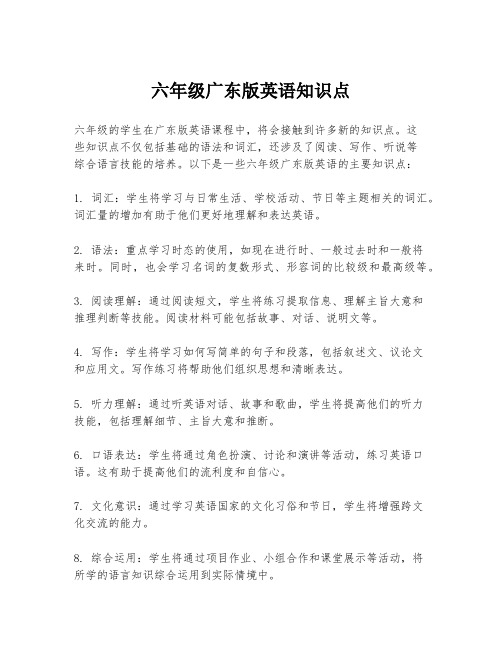
六年级广东版英语知识点六年级的学生在广东版英语课程中,将会接触到许多新的知识点。
这些知识点不仅包括基础的语法和词汇,还涉及了阅读、写作、听说等综合语言技能的培养。
以下是一些六年级广东版英语的主要知识点:1. 词汇:学生将学习与日常生活、学校活动、节日等主题相关的词汇。
词汇量的增加有助于他们更好地理解和表达英语。
2. 语法:重点学习时态的使用,如现在进行时、一般过去时和一般将来时。
同时,也会学习名词的复数形式、形容词的比较级和最高级等。
3. 阅读理解:通过阅读短文,学生将练习提取信息、理解主旨大意和推理判断等技能。
阅读材料可能包括故事、对话、说明文等。
4. 写作:学生将学习如何写简单的句子和段落,包括叙述文、议论文和应用文。
写作练习将帮助他们组织思想和清晰表达。
5. 听力理解:通过听英语对话、故事和歌曲,学生将提高他们的听力技能,包括理解细节、主旨大意和推断。
6. 口语表达:学生将通过角色扮演、讨论和演讲等活动,练习英语口语。
这有助于提高他们的流利度和自信心。
7. 文化意识:通过学习英语国家的文化习俗和节日,学生将增强跨文化交流的能力。
8. 综合运用:学生将通过项目作业、小组合作和课堂展示等活动,将所学的语言知识综合运用到实际情境中。
9. 自我评价:鼓励学生进行自我反思和评价,以提高自主学习能力和自我监控能力。
10. 学习策略:教授学生有效的学习策略,如预习、复习、笔记技巧等,帮助他们更有效地学习英语。
通过这些知识点的学习,六年级的学生将为进一步的英语学习打下坚实的基础,并为将来的学术和职业生涯做好准备。
记住,学习语言是一个持续的过程,需要耐心和持续的努力。
六年级上册英语广州版
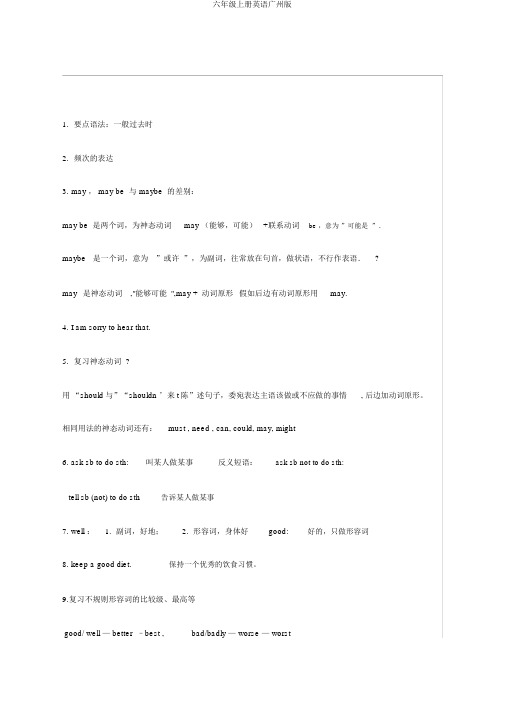
1.要点语法:一般过去时2.频次的表达3.may , may be 与 maybe 的差别:may be 是两个词,为神态动词may (能够,可能)+联系动词be ,意为”可能是”.maybe是一个词,意为”或许”,为副词,往常放在句首,做状语,不行作表语.?may是神态动词,"能够可能",may +动词原形假如后边有动词原形用may.4.I am sorry to hear that.5.复习神态动词 ?用“should与”“shouldn ’来t陈”述句子,委宛表达主语该做或不应做的事情, 后边加动词原形。
相同用法的神态动词还有:must , need , can, could, may, might6. ask sb to do sth:叫某人做某事反义短语:ask sb not to do sth:tell sb (not) to do sth告诉某人做某事7. well : 1. 副词,好地; 2. 形容词,身体好good:好的,只做形容词8. keep a good diet.保持一个优秀的饮食习惯。
9.复习不规则形容词的比较级、最高等good/ well — better –best ,bad/badly — worse — worstmany/much — more —most,little — less — least far — farther — farthest10.祈使句。
祈使句是用来表达命令、恳求、劝说、警示、严禁等语气的句子。
必定祈使句有以下几种种类:1) Do 型 ----Do (表示行为的动词原形)+宾语 +Sit down, please.2) Be 型 ----Be+ 名词/ 形容词 +Be quiet!3) Let 型 ----Let+ 宾语(往常是第一或第三人称宾格)+动词原形 +Let ’ s go shopping. 第一人称,用let sb not do sth;非第一人称,用don’t let sb do sth.否认祈使句有以下 2 种种类:1) Don’t型 ----Do n’ t+动词原形 +2) No 型----No+ 名词或动词ing 形式 .11.介词A.时间介词是用来表示时间的介词:1) on 表示在详细的某一天或详细的某一天的上午、下午或夜晚。
2017广州六年级上册英语期末复习
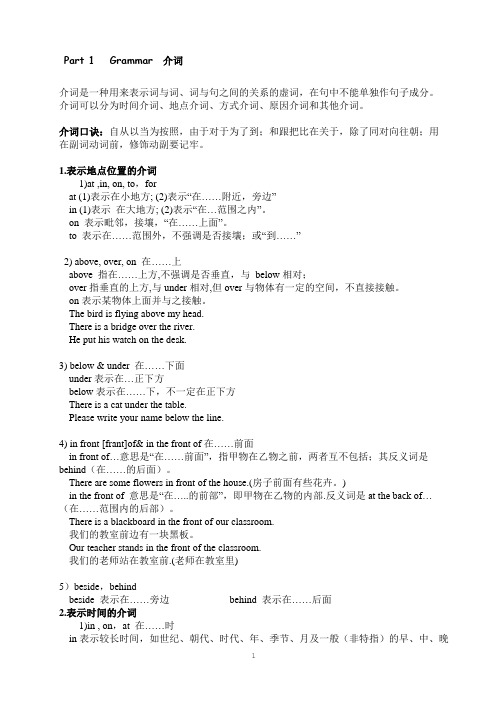
Part 1 Grammar介词介词是一种用来表示词与词、词与句之间的关系的虚词,在句中不能单独作句子成分。
介词可以分为时间介词、地点介词、方式介词、原因介词和其他介词。
介词口诀:自从以当为按照,由于对于为了到;和跟把比在关于,除了同对向往朝;用在副词动词前,修饰动副要记牢。
1.表示地点位置的介词1)at ,in, on, to,forat (1)表示在小地方; (2)表示“在……附近,旁边”in (1)表示在大地方; (2)表示“在…范围之内”。
on 表示毗邻,接壤,“在……上面”。
to 表示在……范围外,不强调是否接壤;或“到……”2)above, over, on 在……上above 指在……上方,不强调是否垂直,与below相对;over指垂直的上方,与under相对,但over与物体有一定的空间,不直接接触。
on表示某物体上面并与之接触。
The bird is flying above my head.There is a bridge over the river.He put his watch on the desk.3)below&under 在……下面under表示在…正下方below表示在……下,不一定在正下方There is a cat under the table.Please write your name below the line.4)in front [frant]of& in the front of在……前面in front of…意思是“在……前面”,指甲物在乙物之前,两者互不包括;其反义词是behind(在……的后面)。
There are some flowers in front of the house.(房子前面有些花卉。
)in the front of 意思是“在…..的前部”,即甲物在乙物的内部.反义词是at the back of…(在……范围内的后部)。
广州版小学英语六年级上册复习归纳1
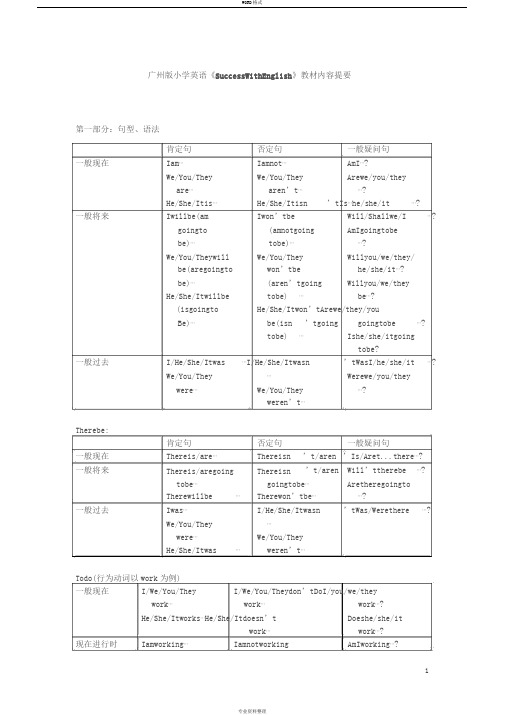
广州版小学英语《SuccessWithEnglish》教材内容提要第一部分:句型、语法肯定句否定句一般疑问句一般现在Iam⋯Iamnot⋯AmI⋯?We/You/They We/You/They Arewe/you/theyare⋯aren’t⋯⋯?He/She/Itis⋯He/She/Itisn ’tIs⋯he/she/it ⋯?一般将来Iwillbe(am Iwon’tbe Will/Shallwe/I ⋯?goingto (amnotgoing AmIgoingtobebe)⋯tobe)⋯⋯?We/You/Theywill We/You/They Willyou/we/they/be(aregoingto won’tbe he/she/it⋯?be)⋯(aren’tgoing Willyou/we/theyHe/She/Itwillbe tobe) ⋯be⋯?(isgoingto He/She/Itwon’t Arewe/they/youBe)⋯be(isn ’tgoing goingtobe ⋯?tobe) ⋯Ishe/she/itgoingtobe?一般过去I/He/She/Itwas ⋯I/He/She/Itwasn ’t WasI/he/she/it ⋯?We/You/They ⋯Werewe/you/theywere⋯We/You/They ⋯?weren’t⋯Therebe:肯定句否定句一般疑问句一般现在Thereis/are⋯Thereisn ’t/aren ’Is/Aret...there⋯?一般将来Thereis/aregoing Thereisn ’t/aren Will’t therebe ⋯?tobe⋯goingtobe⋯AretheregoingtoTherewillbe ⋯Therewon’tbe⋯⋯?一般过去Iwas⋯I/He/She/Itwasn ’t Was/Werethere⋯?We/You/They ⋯were⋯We/You/TheyHe/She/Itwas ⋯weren’t⋯Todo(行为动词以work为例)一般现在I/We/You/TheyI/We/You/Theydon’t DoI/you/we/theywork⋯work⋯work⋯?He/She/Itworks⋯He/She/Itdoesn’t Doeshe/she/itwork⋯work⋯?现在进行时Iamworking⋯Iamnotworking AmIworking⋯?1We/You/Theyare ⋯Areyou/we/theyworking⋯We/You/Theyaren’t working⋯?He/She/Itis working⋯Ishe/she/itWorking⋯He/She/Itisn ’t working⋯?working⋯一般将来I/We/You/He/She/It I/We/You/He/She/It/They WillI/we/you//Theywillwork won’twork ⋯they/he/she/it⋯I’mnotgoingtowork ⋯work⋯?I’mgoingtowork We/You/Theyaren’t AmIgoingto⋯goingtowork ⋯work⋯?We/You/Theyare He/She/Itisn ’tgoingtoAreyou/we/theygoingtowork ⋯work⋯goingtoworkHe/She/Itisgoing ⋯?towork⋯Ishe/shegoingtowork⋯?一般过去I/We/You/They/He/ I/We/You/They/He/ DidI/we/you/they/She/Itworked ⋯She/Itdidn ’twork ⋯/he/she/itwork⋯?1.读下面的特殊疑问式的句子,你能总结一些特殊疑问句的构成的规律吗?I.Wholivesthere.Whoissingingintheroom?Whowasathomeyesterday?II.Whatdoeshedo?Whatishedoing?Whatdidtheydo?Whendoesheusuallygetup?Whendidshehavedinneryesterday?Whereishenow?Wherearetheyplantingtrees?Wheredidtheyplayfootball?Howisyourmother?Howishecoming?Howdidtheygetthere?Whydoeshegothere?Whydidshegothere?III.Whosebookisthis?Whoseparentsarecominghere?Whichbookisyours?Whichpresentsdidhegiveyou?22.关于形容词、副词的比较级和最高级(1)你知道形容词、副词的比较级和最高级构成的一些规律吗?A.一般情况下加-er,-est:long–longer,longest;small–smaller,smallestB.重读闭音节,双写最后一个字母再加-er,-est:big–bigger,biggest; hot–hotter,hottestC.辅音字母加y,改作后一个字母y为i再加-er,-est:funny–funnier,funniest, lucky–luckier,luckiestD.部分双音节和多音节词,加more,most:slowly–moreslowly,mostslowly; moredelicious,mostdeliciousE.不规则变化:good–better,best; bad–worse,worst(2)你知道形容词、副词的比较级和最高级句子的构成吗?A.Thisbookisnewerthanthatone.TheEnglishbookisthenewestofthethree.MikerunsfasterthanJohn.Mikerunsfastestinhisclass.B.Thisflowerismorebeautifulthanthatone.Thistreeistheoldestinthepark.Thegirlisswimmingbetterthanthegirl.Jimswimsbestinhisgroup.C.Snakesaremoredangerousthanfrogs.Themeetingisthemostimportant.Theoldmanwalksmoreslowlytheyoungman.Katejumpshighestinherclass.D.TimhasmorebooksthanJim.Timhasthemoststampsinhisclass.3.关于代词some-,any-,no-,every-:(1)some-多用在肯定句表示请求得到某些东西的句子:Someonewillcomehere.Wouldyoulikesomethingtoeat.(2)any-多用于疑问句或否定句:Isthereanythinginthebox?Wedon’twanttoseeanyoneofthem?(3)no-是事实的否定:Thereisnothingintheroom.Nobodycandothat.(4)代词some-,any-,no-,every-语法上看成是第三人称单数:Thereissomethinginthebottle.Everyonelikesit.3表1:小学教材各话题板块涉及的主要内容话题板主要涉主要涉及单词快及模块数字、B1M6 基数、序数、星期、数量、B3M5-6 日期、月份、季节、时间、B5M1 年份、钟点的表达、日期计量单位等购物B3M1 money,change,shopB4M4 assistant,vendor人物:年B1M2 表男女老少的类别龄、体貌B2M3 名、身体部位名、服衣着、性B3M1-4 饰名、体质与外貌形格、职业、B4M1-2 容词、性格形容词、爱好与特B5M2 职业、表特长爱好的长、理想、B8M3 动词生平B8M5学校生B4M3 科目名、作息动词、活:课B5M1 运动、娱乐动词程、作B6M1息、课B6M3外活动家庭生B2M1 家庭成员名、职业名、活:家B3M6 爱好特长动词、娱乐庭成员B4M4 形式名词及动词、家及其职B5M1 务动词、频度副词业与爱好、家务与休闲食品B4M4 食品名、三餐名、进B6M5 食动词生活习B6M2 描述体质的形容词、惯与健B6M5 描述身体感觉的形容康词、生活习惯的动词、主要涉及语法、功能等名词复数;Howmany/Howheavy/Howlong/Whattime/When 等引导的疑问句和回答等;时间、星期、日期的询问与表达;招呼与应答;表达要买某种商品或询问是否有某种商品;对商品的评论;询问价格;询问是否还需其他商品及应答;找零描述体质外貌的各种句式:be+adj,has/have+n,with+n,in+n 的用法表示爱好与特长的句式: likesth/doingsth,begood/badat⋯,do(es)⋯well;描述爱好与行为习惯等的一般现在时:Hereadsalot.HewatchesTVveryoften等;表示职业、愿望的句式:be+jobs;Iwanttobea⋯whenIgrowup.IhopeIcan⋯叙述生平的句式:beborn⋯一般现在时的各种句式一般现在时的各种句式;询问与表达频度;谈论对娱乐节目的爱好;评论娱乐节目三餐时间;谈论饮食习惯;对饮食的偏好与评论;待客用语及应答描述身体感觉和状况看病用语情态动词 should的用法祈使句4(电B7M3-4话)邀约与聚会动物、B1M2 植物B2M2B5M2-3B5M5B6M4 天气与B6M1 季节B6M6节假B1M5 日、旅B5M4行、城B7M1-2市、计B7M6划与建B7M3-4议地点、B2M4-6方位与B5M6 方向变化:B6M3 人的变B8M1 化、地方的变化过去的B7M5事情B8M2-4邀请与应答电话用语商量聚/约会时间、地点、交通方式等动植物名、动物行为描述动物外貌和习性的一般现在时方式动词、公园行为祈使句动词、描述动作的副规则的表达(can,need,must,mustn’t)词天气形容词、气象名询问与描述天气词、季节性娱乐和体比较天气育活动动词谈论对季节的偏好节假日名、交通方式询问计划和称述计划名、国家与城市名、各种提建议的句式描述城市的形容词、描述和比较城市休闲娱乐动词描述传统节日房间名、家具名、场描述位置关系所名、学校场室名、问路和指路方位介词、描述场室描述场室的形容词动词的过去式描述体貌性格、职业身份、行为习惯、能力、场所处室、天气等各种变化动词的过去式讲述过去的事情故事中的词组描述人物的生平讲述故事表2:小学教材话题分配Module Book1Book2Book3Book4Book5Book6Book7Book81 GreetingsRelationships Clothes Age Routines OurLifePlansChanges√/Shopping √And√√√√Dates√2 MyBody Animals People Activities AbilitiesSeeing aCitiesDiaries√√√/Hobbies√√Doctor√√√3 StationeryNationalitiesOccupations Sports Plants Our an Famous√√√School Invitation People √√and Our5Class √4 Colours MyRoom PeopleWho Entertainment TravelWildOnthe Stories √ HelpUs √√ Animals telephon e and√√Fables√√5 Transport MyHouseTime Foodand Zoo Eating ThePast Hopes√ √ √ Drink Animals Habits √and √ √Fantasi es √ √6 Numbers MySchool DaysOfThe Shoppin g Directio ns Weather Festivals andShapes √ Week √ √ √ √√ √表3:小学教材动词分类日常作息:wakeupgetupgetdressedwashtheface brush theteeth have breakfastgo to school goto workhave lessons havelunchtakearest play sport s takeexercises go(back)homehavedinnerdohomework haveabathgotobedsleepeatdrinkcook娱乐休闲:haveapartyhaveapicnic dosomereading doshoppinggoshopping goboatinggoswimming gosightseein ggofishinggotravelinggoonarivercruise gotothecircus goto theflower show goto th e cinema gotoa footbal l matchwatch afootball matchonTVcome to tea seea filmwatch thebirds listen to music / theradiowatch TV climbthemountain playcards e-mailafriendwritealettervisitafriend/Beijingmeetafriend爱好与特长: singdrawpaintplaythepiano/theguitar dowellin ⋯makeashipmodelplaycardsplaychess体育运动: runswimskiprope swim play basketball playfootball playtabletennisplaytennisplaybadmintondoweight-lifting家务:watertheflowersdogardeningplanttrees/flowerscleanthehousesweepthefloor washthedishes cook washthecar washclothes feedthepet学习:read listen speak write study learn practice hand inthehomework borrowabook returnabook catchupwithteach markthehomework preparethelessons tellastory6心理和情感活动:want love enjoy like dislike love prefer hope wish agreewith think dream feelsad/happy/excited/boredworry身体健康:takeexercise seeadoctorhaveacold/fever/toothache/headacheeat drink takethemedicine goonadiet feeltired/hot/cold/ill/sick感官动词:listento hear lookat see watchfeelhot/cold/tired soundinteresting/different/greatlookyoung/tall/beautiful/fresh/good种植活动:grow/plantatree grow/plantflowers watertheflowers digahole fillintheearth pickupthefruit appear位置移动:leave leavefor startfor move bring take climb run walk swim jump fly sitdown standup throw⋯at⋯travel go comegetto⋯getoutof⋯getdown fall fallover与职业有关的动词:work putoutfires cleanupeverythingdeliverletterscatchcriminals servefoodanddrinks helpinashopdriveataxi/anambulance checkyourteeth helpustolearnhelpsickpeople与“说”有关的动词:say speak talk tell与“看”有关的动作:look lookat lookfor watch see其它动词:last begin start end finish bite blow blow outbuy call carry catch change check close open countcostcover crash cut decorate free changegive grow /grow uphelpinvite getwet kill keep look for make need put onputout show turn waitfor runinto crashinto weighhavehavearest haveabath haveacold haveagoodtime havebeento⋯havealook havefun havetotaketakeamessage takearest takemedicine takeexercise takephotos takeabus takemetotheflowershow takethethirdleft I’lltakeit.WORD格式playplay computergames play cards playbasketball playmusicalinstruments playthepiano7专业资料整理。
2017最新广州版英语六年级上册知识点汇总

2017最新广州版英语六年级上册知识点汇总知识点概要:Module 1 Country lifeUnit 1 What are those farmers doing?Unit 2 A country life is a healthy lifeModule 2 City lifeUnit 3 Where are you from?Unit 4 I like the city very muchModule 3 HealthUnit 5 What’s the matter with you?Unit 6 The secret to good healthModule 4 Past experiencesUnit 7 What did you do yesterday?Unit 8 A trip to Hong KongModule 5 ChangesUnit 9 Was I a good girl back then?Unit 10 Then and nowModule 6 FestivalUnit 11 I like the Spring Festival bestUnit 12 Christmas以下为详细内容▼Module 1 Country lifeUnit 1 What are those farmers doing?一、词组feed the chickens and ducks feed the pigs feed the horse grow flowers and vegetables plant trees cut grassany other on the farm a few…二、句型:1.What are those farmers doing?They’re cutting grass to feed the animals.2.What do you grow on your farm?3.We have a few goats and pigs.4.There are fruit trees in this field.5.There is a cow on the farm.三、重点精析:1. any other + 名词单数,指一堆当中的的某一个any other + 名词复数,指一堆当中的一些如:Tom runs faster than any other student in his class.汤姆比他班上的任何人都跑得快。
广州版小学英语六年级上册单词及音标学习

广州版小学英语六年级上册单词及音标学习广州版小学英语六年级上册单词及音标学习Module1 Plans Unit1 What Are We Going toa lot of 许多clothes [kləuðz] 衣服cruise [kru:z] 漫游dimsum 点心have been to 到过Module1 Plans Unit2 What Shall We Dogo fishing 钓鱼king [kiŋ] 国王love [lʌv] 很喜欢on [ɔn] 按照stupid [‘stju:pid] 愚蠢的Module2 Cites Unit4 I Know This CityAmerica [ə’merikə] 美国Canberra [‘kænbərə] 堪培拉capital [‘kæpitəl] 首都excellent [‘eksələnt] 极好的flag [flæg] 旗舰Module2 Cites Unit5 Where Would They LikBerlin [bə:’lin] 柏林crowded [‘kraudid] 拥挤的just [dʒʌst] 恰好maybe [‘meibi] 可能million [‘miljən] 百万个Module3 An Invitation Unit7 Ben Wants to bored 无聊的circus [‘sə:kəs] 马戏团come to tea 来喝茶go boating 去划船go swimming 去游泳Module3 an Invitation Unit8 Janet Is Goi bring [briŋ] 拿来CD 光盘have a picnic 举行野餐invite [in’vait] 招待no problem 没问题Module4 On the Telephone Unit10 May I Sp afraid [ə’freid] 害怕的answer [‘a:nsə] 回答bookstore [‘bukstɔ:(r)] 书店busy [‘bizi] 的doll [dɔl] 玩具娃娃free [fri:] 免费的广州版小学英语六年级上册单词及音标学习Module4 On the Telephone Unit11 Whos Ca dial [‘daiəl] 拨did [did] 干felt [felt] 的过去式goodbye [¸gud’baɪ] 再见had [hæd¸ həd¸əd] 有Module5 The Past Unit 13 What Did You Do anybody [‘eni¸bɔdi] 无论谁dirty [‘də:ti] 肮脏的evening [‘i:vniŋ] 晚上mark [ma:k] 标记meal [mi:l] 一餐Module5 The Past Unit14 What Was Judys classmate [‘kla:smeɪt] 同班同学different from 不同finish [‘finiʃ] 做完floor [flɔ:¸ flɔə] 地面got [gɔt] 到达Module6 Festivals Unit16 Christmas Is Co ask for 请求Britain [‘britən] 不列颠Christmas [‘krisməs] 圣诞节decorate [‘dekəreit] 装饰Easter [‘i:stə] 复活节Module6 Festivals Unit17 Its the Spring adult [ə’dʌlt¸‘ædʌlt] 成年人dragon [‘drægən] 龙Dragon Boat Festival 龙舟节dumpling [‘dʌmpliŋ] 饺子during [‘djuəriŋ] 过程中。
新教科版(广州)英语六年级上册全册知识点归纳全篇

可编辑修改精选全文完整版教科版六年级上册基础知识汇总Unit 1 What are those farmers doing? 【重点单词】1.country农村2.field田3.pick摘4.grass草5.cow奶牛;母牛6.sheep绵羊(单复数一样)7.goat山羊8.goose鹅(复数是geese)9.river河;江10.other其他的;别的/其他的(人或事)11.few极少;几乎没有【重点短语】1.feed the chickens and ducks喂鸡和鸭子2.feed the pigs喂猪3.feed the horse喂马4.grow flowers and vegetables种花和蔬菜5.plant trees植树6.on your farm在你的农场里7.in this field在这片田里8.pick some apples摘一些苹果9.grow rice种植水稻10.cut grass割草11.feed the animals喂动物12.other animals其他动物13.a few几(个、条…)14.on the river在河面上【知识总结】1.What do you grow on your farm,Uncle Chen?句子结构:What do you grow on your/the farm?此句型用于询问对方在农场里种植什么。
例如:—What do you grow on your farm?你在你的农场里种植什么?—Some vegetables.一些蔬菜。
2.You can pick some apples or oranges from the trees if you want.句子结构:You can十动词(短语)原形十if you want..此句型用于表达“如果你想要的话,你可以…”。
if是连词,在这里用于引导条件状语从句,意为“如果”。
广州版小学英语六年级上每单元知识点

观看VCD
三、句型
1.
Apicnicwouldbegreat.
野餐会很棒。
2.
Wouldyouliketocome?
你愿意来吗??
Yes,I'dloveto.
我很乐意。
3.
ShallIbringsomefood?
要我带些食物来吗?
No,it'sOK.
不用了。
Sure./Allright.
CanIgotoMike'shouse?
我可以去麦克家?
Ofcourseyoucan.
当然可以。
Unit8JanetIsGoingtoHaveaParty
一、单词
★bring
带来
★CD
激光唱片
★outside
外面,在外面
★problem
问题
★VCD
可视激光光盘
invite
邀请
picnic
野餐
二、短语
澳大利亚的首都是堪培拉。
Canberra.
堪培拉。
Unit5WhereWouldTheyLiketoGoOnHoliday?
一、单词
★just
仅仅;恰好
★maybe
可能
★mountain
山;山脉
★noisy
吵闹的
★quiet
安静的
★theGreatWall
长城
Berlin
柏林
crowded
拥挤的
Moscow
玩得开心
13.
havelunch
吃午饭
14.
manytimes
多次
15.
playcards
广州版英语六年级上册知识点
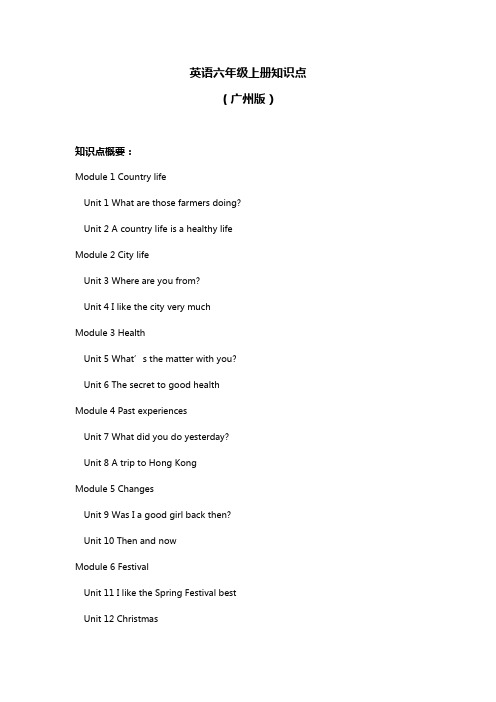
英语六年级上册知识点(广州版)知识点概要:Module 1 Country lifeUnit 1 What are those farmers doing?Unit 2 A country life is a healthy lifeModule 2 City lifeUnit 3 Where are you from?Unit 4 I like the city very muchModule 3 HealthUnit 5 What’s the matter with you?Unit 6 The secret to good healthModule 4 Past experiencesUnit 7 What did you do yesterday?Unit 8 A trip to Hong KongModule 5 ChangesUnit 9 Was I a good girl back then?Unit 10 Then and nowModule 6 FestivalUnit 11 I like the Spring Festival bestUnit 12 Christmas以下为详细内容▼Module 1 Country lifeUnit 1 What are those farmers doing?一、词组feed the chickens and ducks feed the pigs feed the horse grow flowers and vegetables plant trees cut grassany other on the farm a few…二、句型:1.What are those farmers doing?They’re cutting grass to feed the animals.2.What do you grow on your farm?3.We have a few goats and pigs.4.There are fruit trees in this field.5.There is a cow on the farm.三、重点精析:1. any other + 名词单数,指一堆当中的的某一个any other + 名词复数,指一堆当中的一些如:Tom runs faster than any other student in his class.汤姆比他班上的任何人都跑得快。
广州英语六年级上册知识点

Unit 1 What are those farmers doing?词组:1.grow 种植(grow flowers and vegetables); 生长(grow up)2.on the farm 在农场in the field 在地里on the river 在河面上in the river 在河里3.so many + 可数名词复数so much + 不可数名词4.cut grass 割草5.feed the animals 喂养动物6.a few + 可数名词复数(几个) a little + 不可数名词(一些)7.goose(复数geese) tooth(复数teeth) foot(复数feet) (名词单复数看P7表格)8.look+形容词(看起来……)语法:1.现在进行时(标志:now,look,listen,it’s+时间)(基本结构:be+V-ing)Eg. 肯定句:The farmers are feeding the animals now.否定句:The farmers are not feeding the animals now.一般疑问句:Are the farmers feeding the animals now?(be动词提前)特殊疑问句:What are the farmers doing now?(特殊疑问词+一般疑问句)2.There be句型:某地有某人或某物(There is a cup on the table.)Have:某人拥有某人或某物(I have two brothers.)注意:there be 句型不能与have 混在一起使用3.give sth. to sb.= give sb. Sth.Unit 2 A country life is a healthy life词组:1.love (like/enjoy) doing sth. 喜欢做某事2.in the country 在乡下3.wake up 醒来4.help sb.(to) do sth.=help sb. with sth. 帮助某人做某事k the cows 挤牛奶6.more than 多于less than 少于7.plenty of +不可数名词 a lot of/lots of +不可数名词/可数名词复数8.have/eat sth. for breakfast/lunch/dinner 吃……当早餐、午餐、晚餐语法:1.一般现在时(标志词:always usually often sometimes seldom never every…)Eg.肯定句:I wake up at five o’clock every day.否定句:I don’t wake u at five o’clock every day.一般疑问句:Do you wake up at five o’clock every day?(有情提情,有be提be,无情无be请求助)特殊疑问句:When do you wake up every day?(特殊疑问词+一般疑问句)Unit 3 Where are you from?词组:1.Where are you from?=Where do you come from? 你来自哪里?2.be born出生(一般只用过去式)3.What’s …like?=What do/does …look like? ……怎么样?语法:1.注意各种场所,如buildings ,streets ,school, supermarket,hotel ,traffic,cinema,theater,park2.注意各种形容词,如tall/short, new/modern/old, wide/crowded, clean/dirty, heavy/thin, fast/slow,noisy/quiet,comfortable/uncomfortable3.人称的主格,宾格,所有格见P19Unit 4 I like the city very much词组:1.interested 感兴趣的(指人) interesting 有趣的(指事)2.A be different to/from B A不同于B3.The traffic is very heavy. 交通非常拥挤。
广州六年级上学期知识点

7.Was the timetatable different from ours?
8.We started school later and finined earlier.
9.I live at 249 Renmin Road.
1.What did you do yesterday after school ?
2.I saw a film on TV
3.I helped my mum clean the rooms.
4.I painted a picture of some horses.
5.I cleaned my house and did some homework.
10.I live on the eighth floor.
Module6
Fesitivals
1.学习几个节日的表达方法
2.一般过去时的一般疑问句及特殊疑问句
1.This is the best time to be in Britain.
2.It’s the most popular festival in western countries.
3.I prefer to go to Beijing.
4.Guangzhou has a smaller population than Tokyo.
Module3
Module4
Module5
The Past
1.一般过去时的陈述句
2.用一般过去时对比现在和以前的学校
3.用一般过去时描述昨天所做的事情
3.How are you going to get there?
广州版小学六年级英语(上册)每单元要点说明
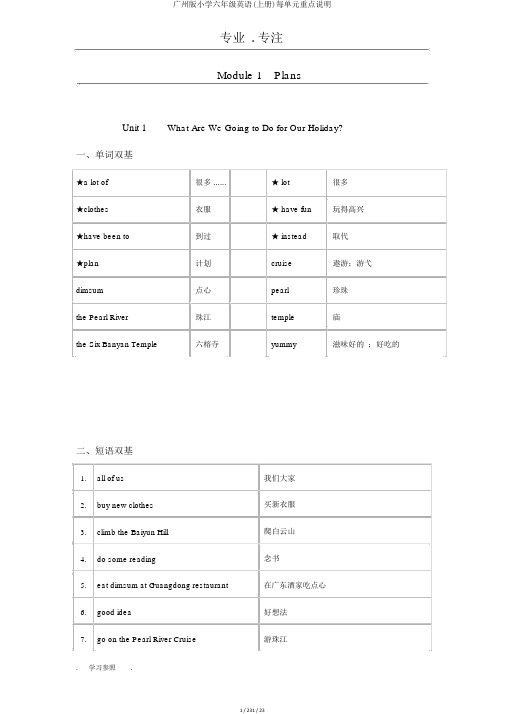
专业 .专注Module 1PlansUnit 1What Are We Going to Do for Our Holiday?一、单词双基★a lot of 很多 ...... ★ lot 很多★clothes 衣服★ have fun 玩得高兴★have been to 到过★ instead 取代★plan 计划cruise 遨游;游弋dimsum 点心pearl 珍珠the Pearl River 珠江temple 庙the Six Banyan Temple 六榕寺yummy 滋味好的;好吃的二、短语双基1. all of us 我们大家2. buy new clothes 买新衣服3. climb the Baiyun Hill 爬白云山4. do some reading 念书5. eat dimsum at Guangdong restaurant 在广东酒家吃点心6. good idea 好想法7. go on the Pearl River Cruise 游珠江专业 .专注8. go shopping in Xiajiu Road 在下九路购物9. Guangzhou Art Museum 广州艺术博物馆10. have been to 到过11. have a lot of fun 玩得很高兴12. have fun 玩得高兴13. have lunch 吃午餐14. many times 多次15. play cards 打牌16. school holiday 学校假期17. see white tiger 看白老虎18. surf the Net 上网19. take photos 照相20. the Pearl River 珠江21. the Six Banyan Temple 六榕寺22. Xiangjiang Zoo 香江野生动物园23. want to do sth. 想要做某事24. watch birds 观鸟25. write a letter 写信三、句型双基1. What are you going to do?你打算干什么?专业 .专注I am going to climb Baiyun Hill. 我打算去爬白云山。
(完整word版)广州版小学英语六年级上短语、句型汇总(word文档良心出品).doc

广州版小学英语六年级(上)短语和句型汇总短语句型Module 1 Country life Unit 1What are those farmers doing?on the farm 在农场里fruit trees 果树in the field 在田里pick apples 摘苹果some geese一些鹅on the river 在河上feed the chickens 喂鸡feed the pigs 喂猪grow flowers 种花plant trees 种树3.---Do you have any other animals on the farm?--Yes, I do.在农场里你还有其他的动物吗?--是的,我有。
1.---What do you grow on your farm, Uncle Chen?陈叔叔,你在农场里种些什么?---I usually grow flowers.我常常种些花。
2.---What are those farmers doing?那些农民正在做什么?---They are cutting grass to feed the animals.他们正在割草喂动物。
Unit 2 on a small farm 在一个小农场in the country 在农村milk the cow 挤牛奶ride a bike 骑自行车get home 回到家much work to do 很多工作要做feel tired 觉得疲倦 a healthy life 一种健康生活4.---So I think a country life is a healthy life.因此,我认为乡村生活是一种健康的生活。
A country life is a healthy life.1.---I love living in the country, but I ’m usually very busy.我喜欢住在农村里,但我经常很忙。
2017最新广州版英语六年级上册知识点汇总

Module 4 Past experiencesUnit 7 What did you do yesterday?三、重点精析:1. bought买(buy的过去式)buy sb. sth. = buy sth. to sb.表示给某人买某物He bought me in new coat.= He bought a new coat for me.2. My mum was angry because I came home late. 我妈妈生气了因为我回家晚了。
angry 生气,愤怒be angry with对……生气(针对人)be angry about因为……生气(针对事)我怎么会对她生气呢?_________________________________________________他对我的错误感到生气。
________________________________________________3. came来(come的过去式)When did you come home? 你什么时候回家的?come in 进来come on 出场,加油come out 出来,发行,开花come after 追赶,追随come back 回来,返回come down 崩塌4. Poor Ben! 可怜的本!Poor 可怜的,贫穷的,劣质的,差的She is in poor health. 她身体不好。
5. Where did you go last night? 昨天晚上你去哪里了?last跟时间词组成短语,常用在一般过去时态中。
如:last night, last week, last month, last Monday, last summer……6. I went shopping with my mother.go + 动词ing形式,用来表示“去从事某种(体育或娱乐)活动”常见的短语有:go bathing 去洗澡go boating 去划船go camping 去野营go climbing 去爬山go cycling 骑车go dancing 去跳舞go drinking 去喝饮料go fishing 去钓鱼go hunting 去狩猎go riding 骑马go sailing 去航行go shopping 去购物go skating 去溜冰go skiing 去滑雪7. They look great. 它们看起来很棒。
广州新版英语六年级上册第一单元知识点梳理和课文背诵

广州新版英语第一学期六年级知识点攻破Module 1 Country LifeUnit 1 What are those farmers doing?一.短语词组(能够听说读写)1. on the farm在农场2. many things很多东西3. fruit trees 水果树4.in the field 在田里5. pick the apples摘苹果6. grow rice 种田7. those farmers 那些农民8. cut grass 割草9. feed the animals喂动物10. give sb sth / give sth to sb 给某人某物11. other animals 其他动物12. a few 一些13. on the river 在河面上14. look lovely 看起来好可爱15. feed the chickens 喂鸡肉16. feed the pigs 喂猪17. feed the horse 喂马18. grow flowers种花19. grow vegetables 种菜20 plant trees种树二.语法知识点名词的复数的复习。
A.单复数不变1.sheep ( )2. deer( )3. grass ( )作为草地可以在后面加es.4. fish ( )B.直接在单词后面加上s. 1. 以清辅音结尾的单词加s变为复数的时候,发/s/的音。
1.book (books)2. shop( shops )3. cake (cakes)4. cliff (cliffs)2.以浊辅音结尾的单词加s变为复数的时候,后面的s 发音为/z/ 1.river (rivers ) 2. toy(toys )3. pig (pigs ) 4 . dog (dogs)C.以s , x, ch, sh 结尾的词加-es 读/iz/1.bus ( )2. box( )3. torch ( )4. brush( )D. 以辅音字母加y结尾的词去y改ies (注意不是辅音字母+y的词)1. factory (factories )2. study (studies )3. monkey(monkeys )4. play (plays)E. 以o结尾的单词,有生命的后面加es,没有生命的后面加s。
广州六年级上册各单元英语知识点归纳

广州六年级上册各单元英语知识点归纳Module 1 Country lifeUnit 1 What are those farmers doing?一、词组:feed the chickens and ducks, feed the pigs, feed the horse, grow flowers and vegetables, plant trees, cut grass, any other, on the farm, a few…二、句型:1.What are those farmers doing? They’re cutting grass to feed the animals.2.What do you grow on your farm?3.We have a few goats and pigs.4.There are fruit trees in this field.5.There is a cow on the farm.三、重点语法:1. 名词单复数:2. any other + 名词单数,和any other + 名词复数,3.表示肯定意义:a little / a few 有一点,有一些表示否定意义: little / few 几乎没有的a few /few +可数名词复数little / a little +不可数名词many /much 意为很多的many +可数名词复数much +不可数名词4. use sth. to do sth. 用……做某事5. be from = come frome 来自……6. also; too; either 的区别:7. give … to… 把…… 给…… give sth. to sb. = give sb, sth.8. There be句型Unit 2 A country life is a healthy life一、词组:wake up, more than, plenty of, ride a bike, get home, at that time, thanks for, lots of…二、句型:1. A country life is a healthy life.2. It takes about 40 minutes.3. I am always very busy but I never feel tired, because I have plenty of exercise.4. When I get home after school, there is still much work to do.三、重点语法:1. live in + 大地点live at + 小地点(如街道、街区等)live on + 楼层2. help sb. (to) do sth. 帮助某人做某事help sb. with sth. 帮助某人做某事3. more than+数词超过,多于4. plenty of = a lot of = lots of + 可数名词复数/ 不可数名词表示许多、大量5. It takes about 40 minutes. 这大约要花二十分钟。
六年级英语第一学期复习要点

六年级英语第一学期复习要点一、四大时态。
1.一般现在时:标志性词有: every day, every + 时间词, never, seldom, sometimes, usually, often, always.构成:1肯定句:A:当主语不是三单时,主语+ 动词原形+ 其他B:当主语是三单时,主语+ 动词的三单形式+ 其它2否定句:A:当主语不是三单时,主语+ don’t + 动词原形+其它B:当主语是三单时,主语+ doesn’t+ 动词原形+其它3疑问句:A:当主语不是三单时, Do +主语+ 动词原形+其它?B:当主语是三单时,Does +主语+ 动词原形+其它?4 特殊疑问句:A:当主语不是三单时,疑问词+do +主语+动词原形+其它?B:当主语是三单时,疑问词+does +主语+动词原形+其它?2.一般将来时:标志性词有:tomorrow, the day after tomorrow(后天), tomorrow + 时间词,next + 时间词, tonight 今晚构成:肯定句:A.主语+will +动词原形翻译为某人将会去做某事B.主语+ be going to +动词原形翻译为某人打算去做某事否定句:A.主语+will +not + 动词原形+ 其它B.主语+ be 动词+ not + going to +动词原形+其它疑问句:A. Will+主语+动词原形+ 其它B. Be 动词+主语+ going to +动词原形+其它特殊疑问句:A. 疑问词+will +主语+动词原形+其它?B. 疑问词+ be动词+主语+ going to +动词原形+其它?3.一般过去时:标志性词有:ago, before, yesterday, the day before yesterday前天, yesterday +时间词, last+ 时间词,that+时间词, this +时间词, just now 刚才构成:肯定句时,主语+动词过去式+其它,否定句时,主语+ didn’t + 动词原形+其它,疑问句时,Did + 主语+ 动词原形+ 其它。
广州六年级英语上册知识点
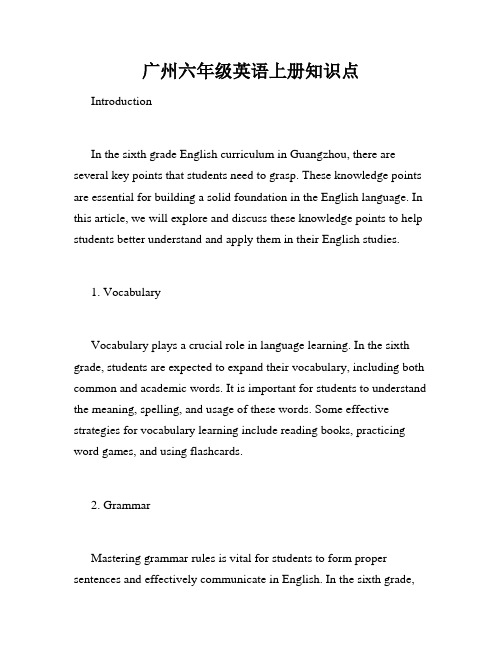
广州六年级英语上册知识点IntroductionIn the sixth grade English curriculum in Guangzhou, there are several key points that students need to grasp. These knowledge points are essential for building a solid foundation in the English language. In this article, we will explore and discuss these knowledge points to help students better understand and apply them in their English studies.1. VocabularyVocabulary plays a crucial role in language learning. In the sixth grade, students are expected to expand their vocabulary, including both common and academic words. It is important for students to understand the meaning, spelling, and usage of these words. Some effective strategies for vocabulary learning include reading books, practicing word games, and using flashcards.2. GrammarMastering grammar rules is vital for students to form proper sentences and effectively communicate in English. In the sixth grade,students focus on more complex sentence structures and tenses. They learn about the correct usage of articles, prepositions, conjunctions, and verb forms. Students should practice analyzing sentence structures and applying appropriate grammar rules in their writing and speaking.3. Reading ComprehensionTo improve reading comprehension, students are encouraged to read a wide variety of texts, including short stories, newspaper articles, and non-fiction books. They should develop the ability to understand the main idea of a text, identify supporting details, make inferences, and draw conclusions. Regular practice of reading and answering comprehension questions will enhance their reading skills.4. Writing SkillsWriting is an essential skill that allows students to express their thoughts and ideas effectively. In the sixth grade, students learn to write coherent paragraphs and short essays. They should focus on organizing their writing, using appropriate transition words, and maintaining a consistent point of view. Practice in writing different types of texts, such as narratives, descriptions, and persuasive essays, will help students develop their writing skills.5. Listening and SpeakingListening and speaking skills are fundamental in communication. Students should engage in various activities to enhance their listening and speaking abilities. These activities include listening to audio materials, watching videos with English subtitles, and participating in group discussions. By actively listening and expressing their thoughts orally, students can improve their communication skills and fluency in English.ConclusionIn conclusion, the knowledge points covered in the sixth grade English curriculum in Guangzhou are crucial for students to become proficient in the English language. By focusing on vocabulary, grammar, reading comprehension, writing skills, as well as listening and speaking abilities, students will develop a strong foundation for further English learning. It is essential for students to actively engage in practice and seek opportunities to apply these knowledge points in their daily lives. With consistent effort and dedication, students will achieve success in their English studies.。
广州版小学英语六年级上每单元知识点
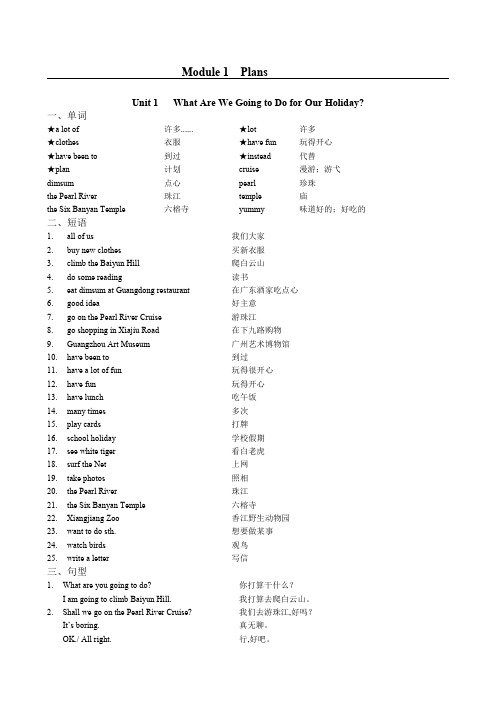
go to the circus
去看马戏
13.
look happy
看起来高兴
14.
maybe later
迟些时候
15.
playcomputergames
打电子游戏
16.
play football
踢足球
17.
seeafilm
看电影
18.
watchTV
看电视
三、句型
1.
Shall we go to see the film The Lion King?
上网
19.
take photos
照相
20.
thePearl River
珠江
21.
theSixBanyanTemple
六榕寺
22.
Xiangjiang Zoo
香江野生动物园
23.
want to do sth.
想要做某事
24.
watch birds
观鸟
25.
write a letter
写信
三、句型
1.
What areyougoing to do?
leavea message
留言
9.
on the phone
通话中
10.
phone sb.
给……打电话
11.
4.
go back toEngland
回到英国
5.
go on holiday
去度假
6.
in the world
在世界上
7.
I would like to do sth.
我想做某事
8.
prefer to
- 1、下载文档前请自行甄别文档内容的完整性,平台不提供额外的编辑、内容补充、找答案等附加服务。
- 2、"仅部分预览"的文档,不可在线预览部分如存在完整性等问题,可反馈申请退款(可完整预览的文档不适用该条件!)。
- 3、如文档侵犯您的权益,请联系客服反馈,我们会尽快为您处理(人工客服工作时间:9:00-18:30)。
2017最新广州版英语六年级上册知识点汇总知识点概要:Module 1 Country lifeUnit 1 What are those farmers doing?Unit 2 A country life is a healthy lifeModule 2 City lifeUnit 3 Where are you from?Unit 4 I like the city very muchModule 3 HealthUnit 5 What’s the matter with you?Unit 6 The secret to good healthModule 4 Past experiencesUnit 7 What did you do yesterday?Unit 8 A trip to Hong KongModule 5 ChangesUnit 9 Was I a good girl back then?Unit 10 Then and nowModule 6 FestivalUnit 11 I like the Spring Festival bestUnit 12 Christmas以下为详细内容▼Module 1 Country lifeUnit 1 What are those farmers doing?一、词组feed the chickens and ducks feed the pigs feed the horse grow flowers and vegetables plant trees cut grassany other on the farm a few…二、句型:1.What are those farmers doing?They’re cutting grass to feed the animals.2.What do you grow on your farm?3.We have a few goats and pigs.4.There are fruit trees in this field.5.There is a cow on the farm.三、重点精析:1. any other + 名词单数,指一堆当中的的某一个any other + 名词复数,指一堆当中的一些如:Tom runs faster than any other student in his class.汤姆比他班上的任何人都跑得快。
Are you taking any other drugs at present?你现在还有服用其他的药吗?2.表示肯定意义:a little / a few 有一点,有一些表示否定意义: little / few 几乎没有的a few /few +可数名词复数little / a little +不可数名词many /much 意为很多的many +可数名词复数much +不可数名词e sth. to do sth. 用……做某事我用钢笔写信。
___________________________________________4.many of them 他们中的许多人many of us many of the boys many of the young men5.be from = come frome 来自……他来自中国。
______________________________________________6. also; too; either 的区别(1)also 意思是“也”,是比too较为正式的用语,通常用于肯定句中,一般靠近动词。
如:He also asked to go.他也要求去。
I also went. 我也去的。
He came also. 他也来的。
(2)too 意思也是“也”,是最普通的用语,常与also通用,但不如also正式,在口语中它用得更多。
too通常放有句末,它也通常用于肯定句中。
如:I went there, too.我也到那儿去的。
Mother was angry too.母亲也发怒了。
(3)either 意思也是“也”。
它用于否定句中,而且要放在句末。
如:If you do not go,I shall not either.倘若你不去,我也不去7. give … to… 把…… 给……give sth. to sb. = give sb. sth.如:Amy gives me a book. = Amy gives a book to me.8. There is a cow on the farm.There be 是英语中常用句型,意思是“有”,表示“人或事物的存在”。
There在此结构中是引导词,已经没有副词“那里”的含义。
当主语是可数名词单数或不可数名词时,be动词要用is;当主语是可数名词复数时,be动词要用are;而它的否定形式是在be动词后面加not。
同时,改为一般疑问句只需要把be 动词提前。
肯定回答为“Yes, there be.”否定回答为”No, there be not.”如:There are five books, two pens and a ruler in the school bag.There is a ruler, two pens and five books in the school bag.四、重点语法:(一)名词单复数(1)从单数变复数,变形规则如下:1、一般情况下,直接加-s。
如:book-books, bag-bags, cat-cats, bed-beds2、以s. x. sh. ch结尾,加-es。
如:bus-buses, box-boxes, watch-watches3、以“辅音字母+y”结尾,变y为i, 再加-es。
如:family-families(家庭), strawberry-strawberries(草莓)4、以“f或fe”结尾,变f或fe为v, 再加-es。
如:knife-knives5、不规则名词复数:man-men woman-women policeman(男警察)-policemen policewoman(女警察)-policewomen mouse-mice child(孩子)-children foot-feet tooth-teeth单复同行:fish-fish sheep(羊)-sheep people-peopleChinese-Chinese Japanese-Japanese6、注意:当people后加上s时,即peoples表示“民族”例如:There are 56 peoples in China. 中国有56个民族。
7、不可数名词:water(水) milk(牛奶) tea(茶) rice(米饭) orange(橙汁)juice(果汁)bread(面包)等注意:1)可数名词,当表示“1”时用a还是an,由后面的单词的首个因素决定,辅音音素前用“a”,元音音素前用“an”。
如:a book an English book2)不可数名词前不能用a或an,常用some,much,a little,a lot of,plenty of表示多少3)用单位词表示,即用a…of + 名词表示。
如:a cup of 一杯…… a bottle of 一瓶…… a piece of 一张……a basket of 一篮…… a can of 一罐…… a bag of 一袋……a pair of shoes 一双鞋two cups of tea 两杯茶five pieces of paper 五张纸Unit 2 A country life is a healthy life一、词组wake up more than plenty of ride a bikeget home at that time thanks for lots of…二、句型1. A country life is a healthy life.2. It takes about 40 minutes.3. I am always very busy but I never feel tired, because I have plenty of exercise.4. When I get home after school, there is still much work to do.三、重点精析:1. live in + 大地点live at + 小地点(如街道、街区等)live on + 楼层2.help sb. (to) do sth. 帮助某人做某事help sb. with sth. 帮助某人做某事有时候我帮我妈妈清洁房间。
____________________________________________我喜欢帮妈妈做家务。
____________________________________________3. more than+数词超过,多于如:More than thirty students are boys in our class.more than + 名词不仅仅是如:Joe is more than a writer; he is a cook, too.more than + 形容词很,非常如:I’m more than happy to see you.4. plenty of = a lot of = lots of + 可数名词复数/ 不可数名词表示许多、大量5. It takes about 40 minutes. 这大约要花二十分钟。
(1) It takes sb. + 时间+ to do sth. 表达花费某人多少时间他花了两天时间去读这本书。
____________________________________________________ 从我家到学校大约要花费三十分钟。
________________________________________________ Doing sth. takes sb. +时间做某事花了某人多少时间写作业花了他两个小时。
_________________________________________________(2) spend time / money on sth = spend time / money (in) doing sth.花费时间/金钱做某事他们花费了一个小时去游泳。
